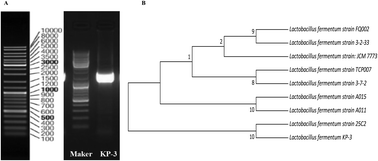Lactobacillus fermentum KP-3 was isolated from Korean pickle and used to ferment ginseng. The changes in the minor ginsenosides in the fermented ginseng were analyzed and the material was evaluated in high fat diet-fed mice. Total ginsenosides increased from 0.746 mg g−1 to 0.939 mg g−1 after fermentation, and the levels of minor ginsenosides (Rg2, Rg3, Rh1, Rh2, F2, and Ro) increased from 0.186 mg g−1 to 0.704 mg g−1. In an animal study, the serum TC and LDL levels in the HFD group were significantly higher than those of the control group. Compared with the HFD group, the probiotic-fermented ginseng significantly decreased the serum TC and LDL levels. In addition, the serum and liver ALT and AST levels were dramatically increased in the HFD group, but these increases were significantly inhibited by treatment with the probiotic-fermented ginseng. Furthermore, fermented ginseng reduced high fat diet-induced liver lipid accumulation. Overall, fermentation with L. fermentum KP-3 enhanced minor ginsenosides in ginseng and this probiotic-fermented ginseng ameliorated hyperlipidemia and liver injury induced by a high fat diet.

